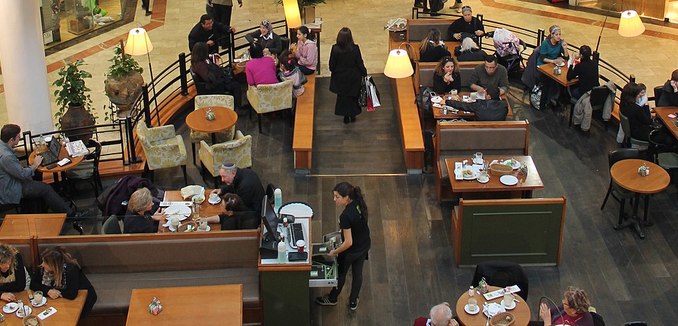An increasing number of residents from Arab sections of Jerusalem are working in the Jewish parts of the city, leading to a narrowing of the income gap between Jews and Arabs in the city, Bloomberg News reported Monday.
Ro’aa, a 22-year-old sales clerk, explained that she didn’t have success working in the Arab section of the city. “There were no benefits, my salary was always two months late,” she told Bloomberg. “On the Israeli side you get paid more and receive all your benefits, and if they see you are working hard you get promoted.”
According to the report, Ro’aa is emblematic of “an increasing number of young Arabs … finding more professional opportunities in the Jewish quarters of Jerusalem.”
“We want to create a better life for our residents,” Hussam Watad, who runs a community center that offers Hebrew classes in the Arab neighborhood of Beit Hanina told Bloomberg. The center also supports lawsuits to improve the infrastructure in Arab neighborhoods. The goal, Watad said, is “to show a rosier future” to resident of Arab neighborhoods.
Currently some 6,000 Arab residents of Jerusalem are studying Hebrew, and more are registering to attend institutions of higher learning in the Jewish sections of the city. The municipality has established one employment center in east Jerusalem and is planning to build a second one.
“It is dripping into the consciousness that Israel is a reality and that if east Jerusalemites want to improve their lives, they might be willing to pay the price of integration,” Ben Avrahami, the mayor’s advisor for east Jerusalem affairs explained. The city of Jerusalem, he said is working to improve the lives of the Arabs living in the city.
The growing integration of Arabs into the city’s economy has helped stabilize the city due to the “shared interest both sides have in this dual economy,” Marik Shtern, a researcher at the Jerusalem Institute for Israel Studies told Bloomberg.
In September 2016, the Israeli government agreed to allocate 1.41 billion shekels ($374 million) toward building public housing for Israeli Arabs and to lift restrictions from construction on private land, with the goal of facilitating the construction of 30,000 apartments on both public and private land in Arab localities.
An October 2014 report by economists Robert Cherry and Robert Lerman highlighted some of the efforts undertaken by the Netanyahu government to “[prioritize] economic development in Arab towns.” Among the initiatives they mentioned were the establishment of employment offices and industrial parks in Arab towns. In addition, Cherry and Lerman wrote, “the Israeli government developed a five-year plan for Arab education and established a special unit in the prime minister’s office to promote economic development in the Arab community.”
[Photo: Zivya / WikiCommons ]




